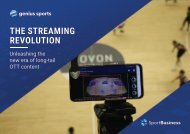Genius Sports Integrity Whitepaper
You also want an ePaper? Increase the reach of your titles
YUMPU automatically turns print PDFs into web optimized ePapers that Google loves.
In association with GENIUS SPORTS<br />
we have through monitoring reports,<br />
the more we understand the possible<br />
threat and the better we can<br />
equip ourselves to safeguard our<br />
competitions in the long-term.<br />
How has bet monitoring technology<br />
evolved over time?<br />
Since Football DataCo first began<br />
using bet monitoring technology,<br />
a major development has been the<br />
continued growth of in-play betting,<br />
which now accounts for up to 75 per<br />
cent of some online bookmakers’<br />
turnover.<br />
For sports, this trend has increased<br />
the need for monitoring technology<br />
that has highly accurate predictive<br />
models. These algorithms are<br />
derived from the technology that<br />
produces odds for bookmakers<br />
and take into account hundreds of<br />
different split-second factors such as<br />
injuries, sudden weather changes or<br />
substitutions.<br />
What does the recent overturn of<br />
PASPA mean for the integrity of<br />
US sports?<br />
Until the Supreme Court ruling in<br />
May, sports betting in the US had<br />
been prohibited outside of Nevada,<br />
leading to the establishment of a huge<br />
illegal betting market, estimated to<br />
be worth more than $150bn a year.<br />
So the integrity threat to US sports is<br />
already an issue from unlicensed or<br />
illegal bookmakers who often operate<br />
offshore. They don’t have the same<br />
obligations to report information<br />
or enforce Know Your Customer<br />
protocols and they often accept higher<br />
levels of betting on individual markets.<br />
Bringing sports betting into the<br />
open through regulation will provide<br />
greater visibility over betting activity<br />
and encourage cooperation between<br />
sports, betting and law enforcement<br />
and government. These are both key<br />
pillars to protecting the integrity of<br />
sports.<br />
Investing in education<br />
For any sport to have an effective<br />
integrity strategy, bet monitoring<br />
technology has to be at the heart<br />
of its approach. But prevention<br />
is better than cure and sports are also<br />
taking major steps to prevent the rot of<br />
match-fixing setting in at all.<br />
The answer lies in education. The<br />
vast majority of sportsmen or women<br />
who become embroiled in match-fixing<br />
scandals have little or no understanding<br />
of the strategies of criminals attempting<br />
to manipulate games or the risks they<br />
are taking.<br />
<strong>Sports</strong> must therefore take<br />
responsibility to educate stakeholders<br />
at all levels. This begins with showing<br />
their participants the typical approach<br />
of a match-fixer and how to spot them,<br />
and the type of information criminals<br />
may look for. It also involves reinforcing<br />
how to respond to these incidents,<br />
including specific reporting protocols,<br />
what constitutes inside information,<br />
and the possible consequences – both<br />
professional and personal.<br />
All levels of a sport<br />
Both in and out of sports, education has<br />
the invaluable ability to provoke longterm<br />
change. And to maximise its value,<br />
sports must put a great deal of emphasis<br />
on the lower levels of their competitions<br />
and on youth teams, where salaries<br />
are lower and their players are more<br />
accessible to the public and possibly<br />
criminal influences.<br />
Giving young players the tools and<br />
knowledge to understand match-fixing<br />
and then report or challenge attempts<br />
by other players, club owners or officials<br />
to manipulate games is paramount.<br />
The foundations of education<br />
begin with face-to-face workshops<br />
between integrity experts and players,<br />
referees, coaches or officials. In-person<br />
sessions (delivered above by <strong>Integrity</strong><br />
Operations Director Ben Paterson) have<br />
greater emotional impact, which can be<br />
particularly useful when demonstrating<br />
the potential consequences.<br />
Meanwhile, the advent of e-learning<br />
technology has provided a new tool in<br />
every sport’s armoury. Ahead of 2018,<br />
the PGA Tour launched a customised<br />
e-learning module that has been made<br />
compulsory for all players, caddies and<br />
officials across its 130 competitions<br />
each year.<br />
Moving with the times<br />
The importance of player education was<br />
clearly demonstrated earlier this year by<br />
the Independent Review of <strong>Integrity</strong> in<br />
Tennis.<br />
This review followed a number of<br />
allegations of potential match-fixing<br />
across world tennis by Buzzfeed and BBC<br />
Sport in January 2016. When publishing<br />
its interim findings in April 2018, the<br />
report recommended that the “TIU<br />
(Tennis <strong>Integrity</strong> Unit) will devote greater<br />
attention to education” going forward.<br />
It recommended expanding the TIU’s<br />
in-person training efforts and delivering<br />
more education to the most vulnerable<br />
participants (those below the top tier of<br />
tennis competition), the appointment of<br />
a dedicated Education Manager as well as<br />
specialist integrity educators.<br />
“Effective education can turn the<br />
tide from an atmosphere of acceptance<br />
and resignation (of match-fixing) to<br />
an atmosphere of active participation<br />
and resolution to deal with the problem<br />
faced,” 1 the report stated. Z<br />
1<br />
IRP 14 Recommendations<br />
4<br />
www.sportbusiness.com | TWITTER@SportBusiness















